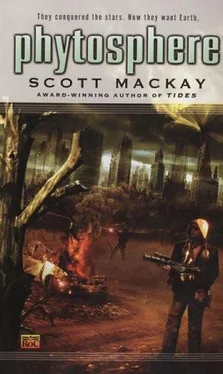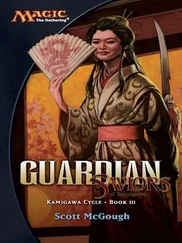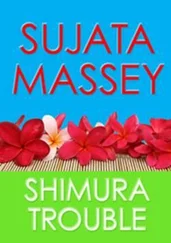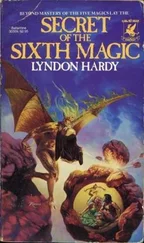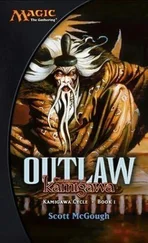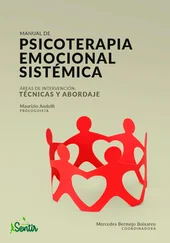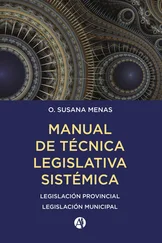The sky elevator at last came to the launch platform, and the doors opened on a large hangar area with a huge polycarbonate pressure door at the far end. Through this pressure door Gerry saw stars in the blackest sky he had ever seen. Was this black sky what the shroud looked like from Earth? he wondered. Had the green gotten so dark it was now black?
Technicians took charge of the Smallmouth , wheeling it away.
Gerry, the mayor, and Mitch found their way to the observation tower, where they saw the entire launch facility spread out below. Several interplanetary craft lay floating in orbit, tethered to workbays that were themselves linked to the platform by flexible pneumatic lifts. The launch facility, shaped like a kidney, measured two square miles, and had a number of hydralike extensions at the ends—tethers that were currently empty. The sun hit the facility with bristling light, but the yellow-tinted visor of Gerry’s pressure suit blunted its brightness. He felt queasy because of the weightlessness, but not overtly so. Immediately below him he saw the small-components launch area. It was here that the Smallmouth would begin its voyage.
The technical crew wheeled the probe along magnetic rails to Platform 5. Once there, they unlatched the Smallmouth from its dolly and connected it to release hooks. They backed the dolly away and disappeared into a nearby hangar.
The countdown began, and when it was finished the probe puttered slowly upward, traveling at no more than a few miles per hour, at last disappearing out of sight as it angled into the transit orbit that would take it to Earth.
Gerry glanced at Hulke. “We have liftoff.”
Hulke sighed. “In a manner of speaking.”
Neil met with the president, the national security advisor, and the secretary of defense at Camp David.
As Neil entered the meeting room, he saw that Tony Bayard was giving him a good looking-over, as if the president expected nothing but the best news from him. National Security Advisor Julia Petrov’s lack of sleep was painfully apparent in her haggard appearance. Secretary of Defense Joe Sidower sat at the end of the table, his bald head bowed as he went over some waferscreen notes. The White House photographer took stills.
Neil’s previous mood of unshakable optimism had now turned to one of cautious pragmatisim. He couldn’t help thinking of the Cameron Chess Study, and how even the smartest human beings hadn’t yet beaten a Tarsalan at chess.
The president sat, and Neil followed suit. Julia Petrov took her seat as well. One of the kitchen staff came around and poured coffee. A plate of Danishes sat in the middle of the table. The food-distribution network was breaking down day by day, its decline driven relentlessly by the growing certainty that there would be no crops next year, which in turn engendered mass hoarding, and people were already going hungry. Yet this morning he was having coffee and Danishes with the president.
“Neil,” said the president, breaking into his thoughts. “Can you give us an update? Your original two-week deadline has come and gone, so I hope the news is good. Your preoccupation… is making me…” The president trailed off.
Neil prided himself on always giving it straight to the president. Yet he began tentatively, and without his usual bravado. “My team and I… we’ve had some time to study the retrieved shroud samples, more than my original two weeks, yes, and the initial results show that the shroud is made primarily of plant material.
On a chromosomal level—and I don’t want to get too technical here—it resembles some of the more common forms of phytoplankton we have in our oceans. The shroud is a living, breathing, growing entity, Mr. President, and it knows how to heal itself.”
The president paused to consider.
“If it’s a living thing,” said Sidower, “it can be killed.”
Neil grinned at this characteristically hawkish response from Sidower. “One would think so. In fact, I had some of the top herbicide specialists in the country come to the lab in Miami to take a look at the specimen. We sat around and had a real bull session about the whole problem.”
“And what did you come up with?” asked the president.
“Well, we hypothesized that we could use some commercially formulated herbicides because, structurally, the shroud is similar to many of the plant and weed varieties that these products are active against. But as we mapped out the specimen’s chromosome, we began to see that some of its DNA sequencing differs from the more common forms of phytoplankton. It was a tough genome, but we finally got it all mapped out.”
“And how, exactly, does it differ?” asked Julia.
Neil glanced at the national security advisor. “Some of the sequencing in the specimen comes directly from Tarsalan genetic makeup itself.”
This, he knew, was the showstopper.
The president’s eyes went wide. “You mean they’ve stirred some of their own genome into the mix?”
Neil raised his palms, as if he were as surprised as the president. “Their splicing techniques are far more… advanced than ours.” He sat back and consulted his waferscreen. “You might remember I wrote a paper on a subset of Tarsalan genes, ones with transmutational properties. These are the ones we’re finding in our samples.”
Sidower made a face as he glanced at the president, not looking too pleased about the growing complexity of the threat.
“If you could give us the essentials,” said the president.
Right. Bayard liked the simplified version. But he wasn’t sure he could simplify something that was so complicated. “Let me go into lecture mode here. The Tarsalans have a subset of genes in their makeup, and this subset of genes can mutate certain of their physical characteristics, depending on environmental circumstances. This is what’s made the Tarsalans so… so adaptable, and it’s why they’ve been able to live on so many different planets throughout the galaxy.” He squinted as he tried to demystify the whole concept. “The simplest analogy would be the jackrabbit. It turns white in winter. Not that the mechanism in the Tarsalan is in any way the same, but it gives you an idea of what I’m getting at. Chameleon lizards turn from brown to green and back again. There’s a transmutational component.”
“So they’ve put some of themselves into the shroud,” said Sidower. “Big deal. How does it affect our odds of defeating the goddamn thing?”
He glanced at the secretary of defense, who was cantankerous for obvious good reason.
“Eventually we will defeat it.” He meant it to be a bold Neil Thorndike proclamation, but it came out sounding weak. “It’s just that I think it will take a little more time than I originally thought. And that’s because the shroud—and, by the way, I prefer to call it the phytosphere now, because that’s what it is, a sphere made out of plant material.” He felt his forehead moistening. “Anyway, the phytosphere seems to adapt to whatever we throw at it, most probably because of this subset of transmutational genes. Also,
we’re finding it hard to penetrate the individual planktons themselves because the Tarsalans have spliced resistant traits of the Martian paleo-organism, Aresphyta, into the mix, and this has created a kind of impenetrable shell around each individual organism. To give you a bit of history—”
“We get the picture, Neil,” said Sidower. “This shell more or less acts as armor.”
“Yes.”
“And there’s no way we can penetrate this armor with conventional herbicides?” asked the president.
“No. I’ve got one team working on finding a herbicide that will effectively destroy the phytoplankton component, another working on destroying the shell, or carapace if you will, and a third studying the Tarsalan genetic component. The main thrust right now is the carapace. We’ve got to find a way to break the carapace. Once we’ve done that, we can concentrate on the organism itself.”
Читать дальше
